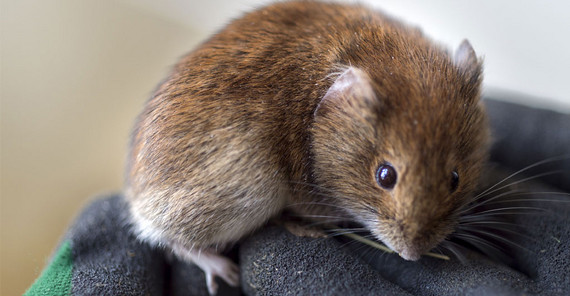Ms. Schneeberger, how are your laboratory animals? How are they cared for?
We have a couple of voles and striped filed mice in our lab that are being cared for by a technical staff member and a graduate assistant. Should one of the two become unavailable, there are four more people on an emergency list who could cover for them. The animals are fine, they surely don’t even notice that there is an exceptional situation.
You usually work with wild mice, not lab mice. Can you release them?
Some of the animals we have in the lab are from outside Potsdam and are due to be released soon. At the moment we are trying to find out to what extent this is possible with the restriction of our freedom of movement. We also have outdoor enclosures that are supposed to be prepared for field experiments, which is something we do every year at this time with a lot of (wo)manpower. We now have to find a different solution for this as well, since we of course follow the recommendations and keep our distance from each other.
What could the solution be?
We are currently working on a form of online coordination for the things that need to be done in the enclosure so that everyone with a case of cabin fever has the opportunity to do something outside. Provided, of course, that no general curfew is introduced. Being able to carry out repairs at the site and be out in the sun for a while is beneficial for every one of us.
What are you currently working on in your home office?
At the moment we are trying to review and publish all of our data from the last fieldwork season between April and October last year. So we have enough to do, even though we are probably not as productive as usual due to the overall level of tension. We all miss the lively exchanges with each other that we usually have in the working group. Many of us also have collaborations in Germany and abroad that would involve business trips – and will probably be cancelled this year, unfortunately. And we are currently trying to find solutions so that we can continue our projects somehow. Our doctoral candidate is the one who is most worried about whether she can continue her work as planned. In light of the situation, however, the German Research Foundation DFG seems to be working on solutions to extend programs accordingly.
How do you keep in touch with your colleagues?
We have just decided today that we will "meet" once a week for a work group Skype meeting, and once a week also via Skype for a kind of virtual coffee break. This improves team spirit and allows us to discuss current problems as well as any progress made.
What about teaching and the students you supervise?
Fortunately, my bachelor and master’s students have already collected all the data they need for their final theses last season. So all three of them can write their theses at home at their leisure. Questions can be discussed via e-mail, WhatsApp and Skype. I am optimistic about this. How courses will be organized for the students is another question altogether. We already had to postpone a planned literature seminar scheduled to take place between semesters until further notice. In this regard, too, we base our activities on the decisions made by the university and are following developments with great interest.
Recent Press Release on olfactory information used by Norway rats
Overview page of all contributions from the University of Potsdam on the corona pandemic

